Welcome to the world of puppy parenting! It can be an exciting yet challenging process, but don’t worry – you’ve got this.
As they say, ‘A tired dog is a happy dog’ and part of making sure your pup is content is preventing them from engaging in destructive behaviors like biting and chewing.
In this article, you’ll learn some tips on how to do just that. Let’s get started!
Understand the Causes
Figuring out why your pup is exhibiting certain behaviors can be tricky, but understanding the causes of their biting and chewing is essential for finding a solution!
Puppies bite and chew for many reasons, including teething, boredom, exploring their environment, curiosity or to get attention. It’s important to properly socialize puppies in order to teach them appropriate behavior when interacting with other animals and humans. This helps them identify their boundaries and learn not to bite or chew on people.
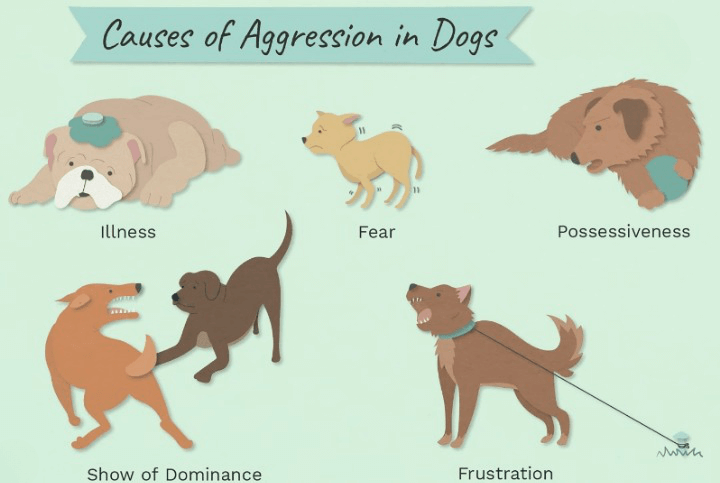
Additionally, it’s important to identify triggers that may lead to biting or chewing such as frustration from being confined too long without any stimulation. Another common cause of puppy biting and chewing is anxiety or fearfulness which often leads to aggression. If your pup is exhibiting this behavior you’ll want to take steps towards helping them feel more secure in any new environments they’re exposed to.
Offering treats when entering places like the vet office can help make these experiences more enjoyable for your pup while allowing them the opportunity learn positive behaviors rather than negative ones like biting or chewing out of fear. It’s also helpful remind yourself that puppies are still learning how act around others so patience will be key during the training process!
Taking time each day working on basic commands like sit/stay will help reinforce good behavior while providing mental stimulation throughout the day which can reduce destructive tendencies associated with boredom or loneliness as well as stress-related issues.
Redirect the Behavior
Redirecting their behavior is the key to creating a happier, healthier relationship with your furry friend. If your pup is biting and chewing, it’s time to show them that these behaviors aren’t acceptable.
The best way to do this is by promoting exercise and mental stimulation and distracting them from their unwanted activities. One of the easiest ways to stop your pup from biting or chewing is with toys! Give them something else to focus on, such as an interactive toy or puzzle. This will help keep their minds occupied, and they’ll associate the activity with positive reinforcement, rather than punishment.
In addition to providing toys, you can redirect your pup’s attention away from items they shouldn’t be playing with by teaching them basic commands like “leave it” or “drop it” when they start nipping at something inappropriate. When they obey, reward them for their good behavior!
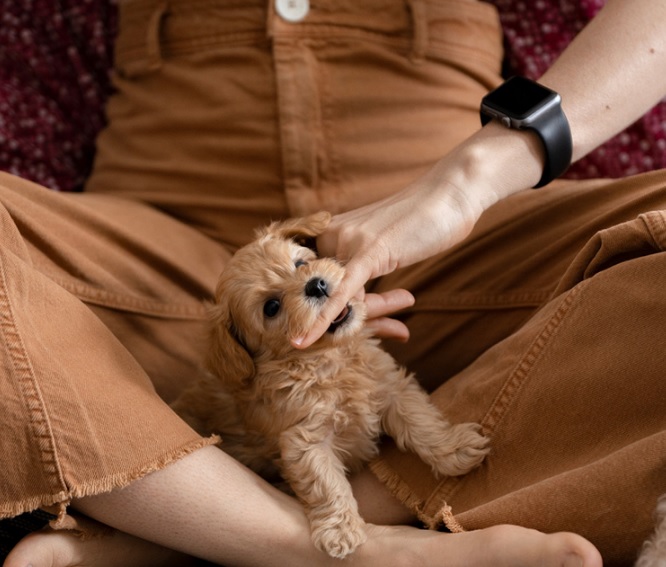
With consistent practice, your pup will learn that biting isn’t acceptable and may even lead to better obedience overall. You can also redirect their energy into more beneficial activities, such as going for walks together or playing fetch in the backyard. Both of these promote physical activity while providing much-needed bonding time between you two!
Allowing your pup plenty of opportunities for exercise will also help burn off excess energy, so they won’t feel compelled to bite or chew out of boredom or frustration. By redirecting these behaviors before they become habits, you’ll have a well-behaved companion in no time!
Provide Appropriate Toys
Providing appropriate toys can be a great way to show your pup that certain behaviors are encouraged and rewarded, helping create an enjoyable relationship for both of you. Puppy proofing and chew proofing your home is the first step in providing appropriate toys.
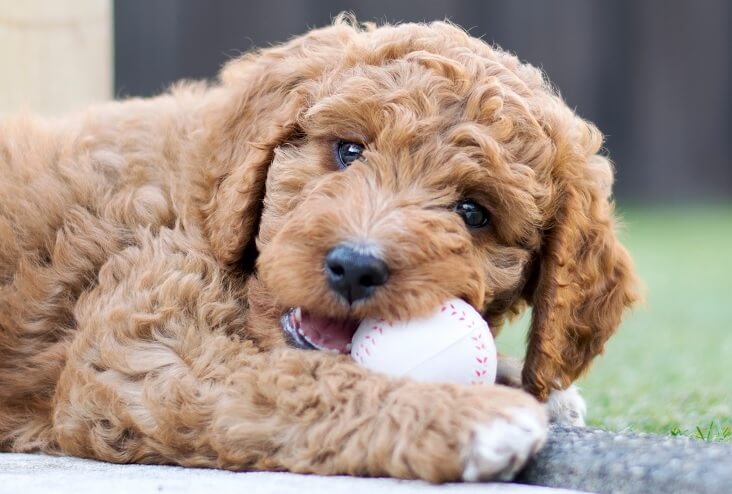
Toys should be safe, durable, engaging, and provide a reward when chewed or interacted with. Here are some things you can do to make sure the toys you provide are appropriate:
- Choose toys made from safe materials such as natural rubber, cotton rope, or jute. Avoid any toy that contains small parts like eyes or squeakers that could become choking hazards if detached.
- Look for chew-resistant material, such as nylon, polypropylene, and thermoplastic rubber (TPR). These materials will help ensure the longevity of the toy by lasting longer against aggressive chewing.
- Go for interactive play items such as balls with holes in them that dispense treats when chewed on or tugging ropes that have knots attached which can also dispense treats during playtime.
- Try giving your pup puzzle toys to solve which increase their intelligence while rewarding them at the same time!
- Offer a variety of different types of toys so your pup doesn’t get bored – rotational play works best since it keeps them engaged with new activities over time!
Not only does providing appropriate toys keep your pup entertained and happy, but it also helps redirect unwanted chewing behavior away from furniture and shoes! If supervised properly, these rewards can help shape positive behavior in puppies while teaching them how to interact respectfully with their environment.
Use Positive Reinforcement
You can help foster a loving relationship with your pup by using positive reinforcement – rewarding them for good behaviors and offering gentle guidance when they make mistakes. Praise training is an effective way to reward your pup when they engage in the desired behavior, such as not biting or chewing. Verbal praise, petting, and treats are all great ways to reinforce the positive behavior. You should also be consistent in your praise and rewards so that the puppy learns what to expect from you.
When dealing with negative behaviors such as biting or chewing, it’s important to remove the item from their reach immediately and enforce a timeout – this serves as both a punishment and an opportunity for them to calm down.
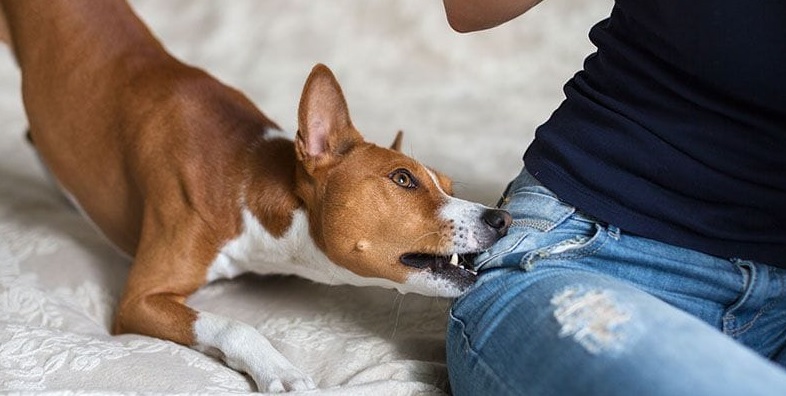
It’s best if these timeouts are used sparingly; otherwise, they can become ineffective or even counter-productive. During this time, you can use some quiet verbal cues such as ‘No’ or ‘That’s bad’ while maintaining eye contact with your pup. This will help them understand that their behavior isn’t acceptable but you still love them unconditionally.
Rather than punishing negative behavior harshly, try redirecting their attention away from it onto something else more appropriate instead – this will help keep them engaged with activities that are healthy for both of you while reinforcing good habits at the same time!
Interacting positively with your pup throughout the entire process helps build trust between you both which is essential for any successful training program.
Biting and Chewing? Seek Professional Help if Necessary
If your pup’s negative behaviors continue despite your best efforts, it may be time to seek professional help. According to the American Veterinary Society of Animal Behavior, up to 80% of dogs display some form of behavioral issue in their lifetime.
Whether you’re dealing with a puppy that is teething and chewing on everything or one that is displaying aggressive behavior towards other animals or people, seeking out assistance from an experienced dog trainer can help you and your pup work through these issues and develop positive behaviors.
One way to start finding the right person for the job is by consulting with your veterinarian about recommended trainers in your area who specialize in puppies. If you don’t have access to a vet or want a more immediate solution, there are also many online resources available such as local pet forums that might be able to provide recommendations.
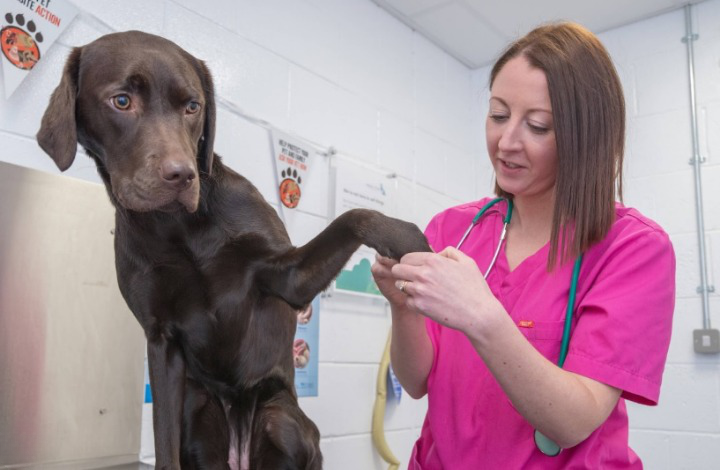
You should also look into any classes offered through animal shelters or obedience schools where you can learn valuable tips for training and reinforcing good habits with teeth cleaning treats and rewards-based methods like positive reinforcement.
It’s important to remember not all trainers use kind methods so make sure you research their approach before signing up for any services. Ask questions about how they handle difficult behavior problems, what techniques they use when teaching puppy classes, and whether or not they keep current on the most effective practices for working with pooches of all ages.
Additionally, if possible attend one session first as an observer before enrolling in regular sessions so you can get a better feel for the instructor’s style and methods.
With the right guidance and support from an experienced professional, both you and Fido will be well on your way toward a happier life together!
Conclusion
It can be hard to stop a puppy from biting and chewing, but starting early is important. With patience and understanding, you can appropriately redirect their behavior and use positive reinforcement to encourage them.
If all else fails, don’t hesitate to seek professional help.
Remember that puppies are like little sponges – they learn quickly! So take the time to teach them how to behave properly, and you’ll reap the benefits for years.
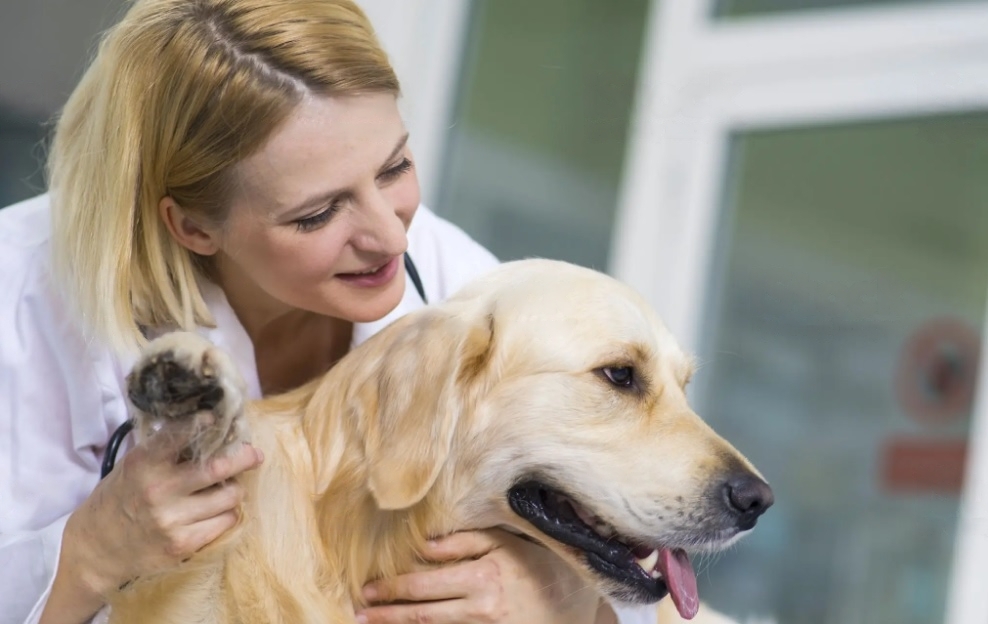
“If you can’t find the right dog for you to adopt locally, please consider adopting a dog from Bone Voyage Dog Rescue. We’ll fly with your dog to you.”
SEE ALSO:
- Why Does Dog Lick My Feet
- How Often Do Dogs Need Rabies Shots
- Why Is My Dog Coughing
- Why Do Dogs Shake? Causes, Symptoms & Treatments
- The Possibility of Dogs Being Autistic
Frequently Asked Questions
How do I know when my puppy is teething?
It can be difficult to determine when your puppy is teething.
To start, look for signs of chewing or biting on safe toys and other items in your home, as this could indicate that they’re teething.
You may also notice them trying to chew on their own paws or body parts.
If you suspect your pup is teething, make sure to puppy proof your house by removing any items that could pose a choking hazard.
Additionally, provide plenty of safe toys for them to chew on and rotate these items regularly so they don’t get bored with the same ones.
Is it okay to give my puppy treats as a reward for not biting?
You want the best for your puppy, and rewarding them with treats is a great way to let them know they’re doing something right! Using positive reinforcement is an effective way to train your pup not to bite or chew.
Plus, it encourages good oral hygiene habits – who doesn’t love that? But be sure you give treats sparingly; too many can lead to unwanted weight gain.
So why not take a moment today to show your puppy some extra love with a special treat as encouragement for being such a good boy or girl?
What is the best way to train my puppy to stop biting?
Training your puppy to stop biting can be daunting, but the best way to do it is through positive reinforcement. Give your pup praise and treats when they don’t bite and redirect their energy to chewing toys. Remember that treats should never be used as punishment, only as rewards for good behavior! With patience and consistency, you’ll soon have the perfect pup that no longer bites.
How long should I wait before seeking professional help for my puppy’s biting?
Training a puppy to stop biting is like teaching a baby to talk: it takes time, patience, and effort.
If you’ve been working with your pup for several weeks or months without success, it may be time to seek professional help.
Obedience classes are an excellent option for socializing puppies and teaching them basic commands like ‘no bite’.
A qualified trainer can teach you how to properly manage your pup’s behavior and provide advice on strategies that will work best for your specific situation.
Don’t struggle alone; enlist the help of a professional and get your pup back on track!
Are there any medical conditions that could be causing my puppy to bite?
Have you noticed that your puppy has been biting more frequently? It could be due to a medical condition.
Identifying any triggers, such as pain or discomfort, is the first step in determining if a medical issue is the cause. Check with your vet to rule out any underlying health issues that may be causing your pup to bite.
Additionally, socializing puppies from an early age can help them develop proper behaviors and reduce the likelihood of aggressive behavior.
Taking these steps can help you get to the bottom of why your pup has been biting more often so you can ensure they’re healthy and happy!
